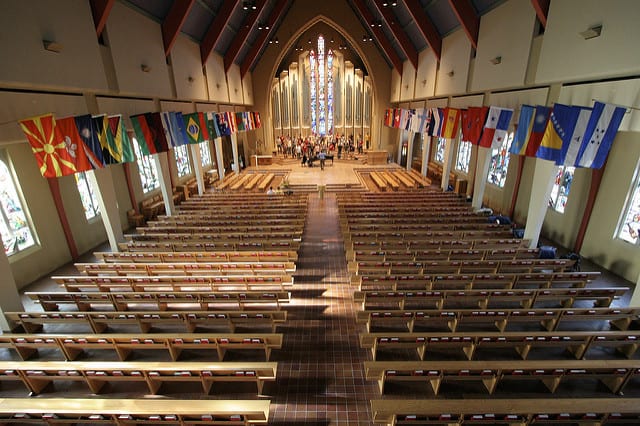
The Great Conversation program has a reputation for grueling, unending reading and sleep-deprived, stressed students. While Great Con students receive ten General Education (GE) credits for their effort, there is one GE that Great Con does not supply: the BTS-T (Biblical and Theological Studies-Theology). Since Great Con has an overabundance of religious texts, it is only logical that a BTS-T credit should be included in the two-year program.
The vast majority of texts covered throughout the course of the Great Conversation discuss religious beliefs, such as Christianity, Judaism, Islam and polytheism. By February of their first year, Great Con students have read much of the Bible, including the books not included in the standard Bible. The religious analysis does not stop there as Great Con students also read numerous religious analyses, personal stories and critiques. No student in Great Con will ever say that the Christian religion was not adequately, excessively and meticulously analyzed.
To prove that the Great Conversation covers every requirement of the BTS-T requirement, let’s take a look at the course guidelines on the St. Olaf Webpage:
1. “The principal focus of these courses must be Christian theology, understood as critical and normative reflection on Christian teachings.”
In the Great Conversation, students read “Martin Luther: Selections from His Writings.” Not only is this text the basis of the College’s theology, but these writings have inspired millions of people and influenced how religion impacts the lives of Christians. An emphasis of Martin Luther is being saved by grace, not by works; therefore, this teaching completely challenges the established doctrine of Catholicism at the time.
2. “Courses must consider substantial examples of historical or contemporary theological reflection, and attend to the context, the variety, and the coherence of the theological claims they advance.”
While Great Con examines many theological reflections, such as Saint Thomas Aquinas’ “Summa Theologica,” and Saint Augustine’s “Confessions,” the course also examines how Christian values and teachings evolved with new generations as in “A Short Account of the Destruction of the Indies” by Bartolome De Las Casas and “Canterbury Tales” by Geoffrey Chaucer.
3. “Courses must include explicit attention to Christian teachings about God and Jesus Christ; courses may include attention to significant aspects of other central teachings as appropriate to specific course goals.”
Since the program emphasizes Christianity, students are required to read many selections from the Bible. However, Great Con also compares Christianity to other religions, such as Islam, Judaism and polytheism. Students read ancient epics like The Odyssey, Islamic texts like the Qur’an and Jewish works like “Debating Truth,” a book that contrasts Christian and Jewish beliefs.
4. “Courses must provide opportunities for students to engage in explicitly theological reflection, and to apply their theological knowledge to matters of historical, contemporary, or personal significance.”
The Great Conversation, as the name states, is an in-depth conversation between students focusing on the materials that they have read throughout the course. How a person perceives the texts is partially based off their prior knowledge and experience. Since the vast majority of Great Con readings discuss theological elements, a large part of the class is engaging in “explicitly theological reflection.” In addition, the description of the Great Con program states, “Students in the program are not passive recipients of information … Rather, they respond to great works in an interdisciplinary way, challenging the ideas expressed in the works and challenging their own ideas as well.”
A large emphasis of the Great Con program is to use texts covered throughout the entire program and relate those readings to newer texts. Therefore, the principals discussed while reading biblical or theological texts remain pertinent to students’ readings of non-religiously focused texts and influence how students understand those texts and their influence.
By participating in Great Con, each student is taking five classes with a heavy emphasis on Biblical and Theological Studies. Therefore, the Great Conversation should include the BTS-T requirement.

